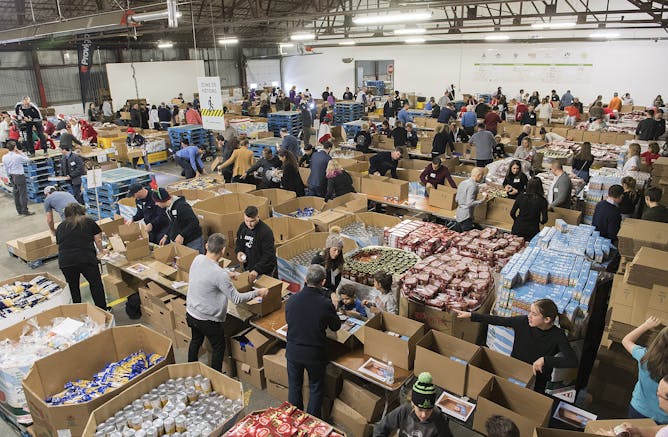|
If you know any new moms and are wondering what they might like for Mother’s Day this Sunday, keep in mind that research shows mothers of infants and toddlers have less time for leisure and physical activities than the rest of the population. That can affect not only their physical health but their mental well-being too.
Today in The Conversation Canada, Dawn Trussell and Jennifer Mooradian of Brock University and Shannon Hebblethwaite and Stephanie Paterson of Concordia University look at the expectations and realities new mothers face when trying to return to leisure and physical activities. The women they encountered in their research were trying to overcome physical challenges, time constraints and socio-economic barriers to seek activities that helped them address stress, anxiety and self-esteem issues and also helped them navigate their new identity as a mother.
There is a role for families and partners in helping them access these activities. As a Mother’s Day gift, the payoff is substantial: “The women’s participation gave them a sense of freedom and control over their lives.”
Also today:
Do you listen to podcasts? The Conversation Weekly would like to hear about your favourites — or why you don’t listen to them. Please take this five-minute survey.
All the best.
|

|
Patricia Nicholson
Health + Medicine Editor
|
|

The gift of sleep, time, self-care (“me time”) and a message of what a remarkable job she is doing may be what new mothers need most this Mother’s Day.
(Shutterstock)
Dawn Trussell, Brock University; Jennifer Mooradian, Brock University; Shannon Hebblethwaite, Concordia University; Stephanie Paterson, Concordia University
Mothers with young children are consistently identified as having lower levels of physical activity and leisure opportunities, which place their physical and mental health at risk.
|

Québec Premier François Legault defended Bill 96 saying he doesn’t want the province to become Louisiana.
THE CANADIAN PRESS/Ryan Remiorz
Richard Budgell, McGill University
For most Québec residents, there is broad consensus that French should be protected. But many of us believe that multilingualism need not threaten French.
|

An inmate can be seen inside a segregation cell at the Collins Bay Institution in Kingston, Ont., in 2016.
THE CANADIAN PRESS/Lars Hagberg
Jessica Evans, Toronto Metropolitan University; Linda Mussell, L’Université d’Ottawa/University of Ottawa
Solitary confinement is still a common feature of prisons across Canada and in its most populous province, especially during the COVID-19 pandemic. It’s a practice that amounts to torture.
|

Amazon has historically opposed trade union recognition by engaging in union suppression practices, like resisting trade union recognition through coercion.
(Shutterstock)
Geraint Harvey, Western University
Amazon can become the Earth’s best employer, but this must involve democratizing the workplace, recognizing the legitimate right of employees to organize and cooperating with labour representatives.
|

The Julian Sreet Inn, Shelter for the Homeless, in San Jose, Calif., designed by Christopher Alexander.
(David Ing/Flickr)
Theodora Vardouli, McGill University
Architect Christopher Alexander’s work will continue to be important not only for designing buildings but also in light of contemporary debates about how data always comes from specific settings.
|

An increasing number of people are falling victim to cryptocurrency scams on dating websites.
(Shutterstock)
Carlo Handy Charles, McMaster University
Online dating scams are costing site users millions of dollars. Regulation needs to hold companies accountable for fraud committed on their platforms.
|
La Conversation Canada
|

Des bénévoles placent des denrées alimentaires dans des boîtes, à Moisson Montréal, le 7 décembre 2019. Les fondations philanthropiques détiennent d'importants capitaux et il est essentiel qu'ils les investissement pour remplir leurs missions.
La Presse canadienne/Graham Hughes
Diane Alalouf-Hall, Université du Québec à Montréal (UQAM); David Grant-Poitras, Université du Québec à Montréal (UQAM); Jean-Marc Fontan, Université du Québec à Montréal (UQAM)
Les fondations accumulent de la richesse. Or, la philanthropie ne doit pas être une entreprise privée vouée à générer et à s’accaparer l’argent. Elle doit agir sur les grands enjeux d’inégalités.
|
Ukraine Invasion
|
-
Jonathan Este, The Conversation
A digest of the week’s coverage of the war against Ukraine.
-
Michael Mulvihill, Newcastle University
Russia is raising the stakes with upgraded ballistic missiles and blood-curdling threats from the Kremlin
-
Nonhlanhla Dube, Lancaster University; Nathan Kunz, University of North Florida
Aid workers are supposed to be protected by international humanitarian law. But increasingly they are being targeted by warring parties.
|
|
Podcasts
|
-
Gemma Ware, The Conversation; Daniel Merino, The Conversation
In this episode of The Conversation Weekly podcast, we also explore the reasons by India’s neutrality over the Ukraine war.
|
|
Arts
|
-
Luke Barnes, Western Sydney University
The multiverse has been the topic of multiple recent films, such as Dr Strange in the Multiverse of Madness and Everything Everywhere All At Once: but what does science know about the multiverse?
|
|
Environment + Energy
|
-
Rachel Thrasher, Boston University; Blake Alexander Simmons, Colorado State University; Kyla Tienhaara, Queen's University, Ontario
A new study adds up the potential legal and financial risk countries could face from hundreds of agreements, like those under the Energy Charter Treaty.
|
|
Health
|
-
Sze Yan Liu, Montclair State University
A global team of researchers analyzed 34 studies of unconditional cash-transfer programs administered in low- and middle-income countries.
|
|
|
|
| |
| |
| |
| |
|
|